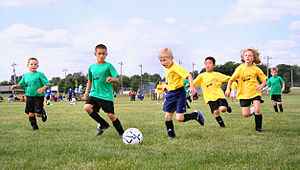
- Image via Wikipedia
I got back to Kansas City this Sunday two hours after the last game was completed and I missed my girls taking second place in the statewide tournament by a fraction. They lost on penalty kicks, 3-2, after an overtime. It was a great tournament and an exciting championship game played at a very high skill level with an excellent team from Topeka whose parents were of a good sort, that is they understand the game is for the kids to play enough for parents to critique. They come all the way from Topeka (90 minute drive) to play in Kansas City and they are in our division in our league and we will see them again on Mother’s Day.
At practice on Monday I decided to use an appreciative inquiry approach to learning about the tournament and to reinforce the strengths of our team which is the tightknit social bonding of the team. After a strenuous workout and cool down session, we were in our team circle getting ready to cheer when I asked each girl to tell me their favorite story about one of their teammates in that tournament. Pretty soon I had 50 excellent vignettes about what happened in the tournament in each girl got to hear another teammate praising her for her hard work.
I couldn’t shut them up.
I then asked him to tell me about what they thought was the funniest moment in the tournament which included my daughter talking other players down, kids getting kicked in the face with the ball, scoring an own goal off a header from a corner kick and we all generally had a hilarious time.
Practice concluded on one of the highest notes ever and I really could see the girls bonding with each other even more.
This technique reinforces our top five: play hard, have fun, support the team, love the game, and respect the other team and ref.
I even found myself asking “what” style questions, by having them provide as many details of the sites, sounds and feelings of the tournament. I really feel like I was there and so I plan to use this technique in the future.
I picked up a book entitled Appreciative coaching: A positive process for change, by Sara Orem, Jacqueline Binkert, and Ann Clancy (2007) (San Francisco:Jossey-Bass)to see how AC might inform my soccer, teaching and business coaching. I’ll let you know how it works out.

![Reblog this post [with Zemanta]](http://img.zemanta.com/reblog_e.png?x-id=7a098985-990a-4057-a98b-de16cb019af8)